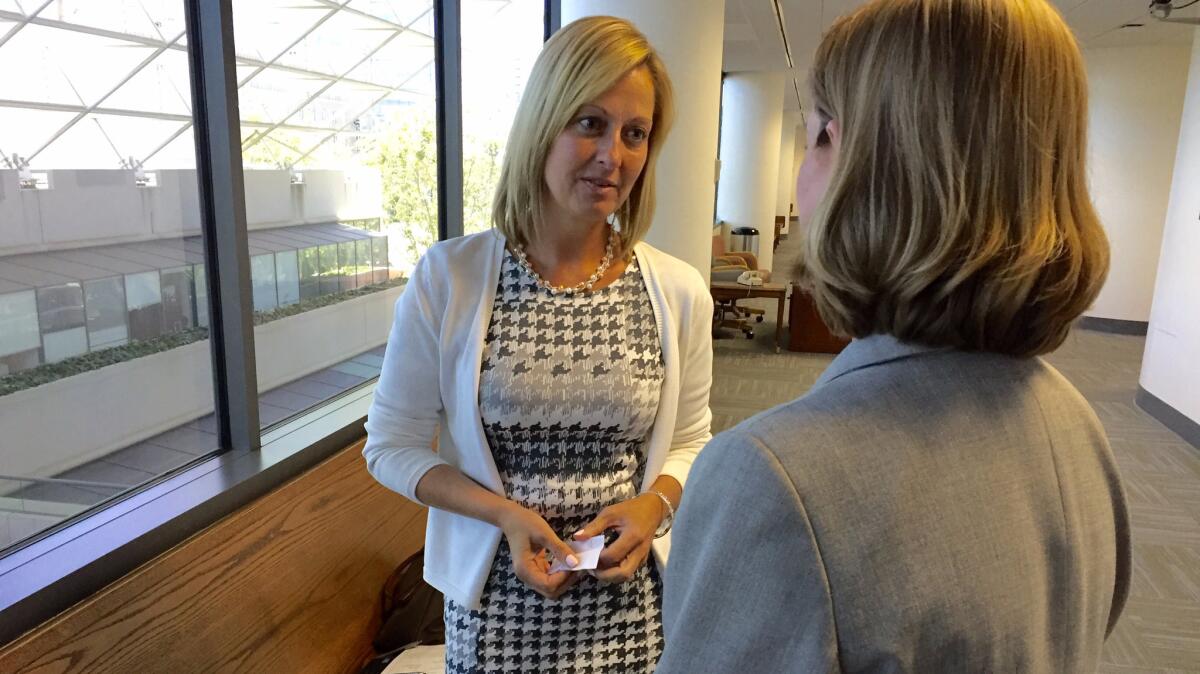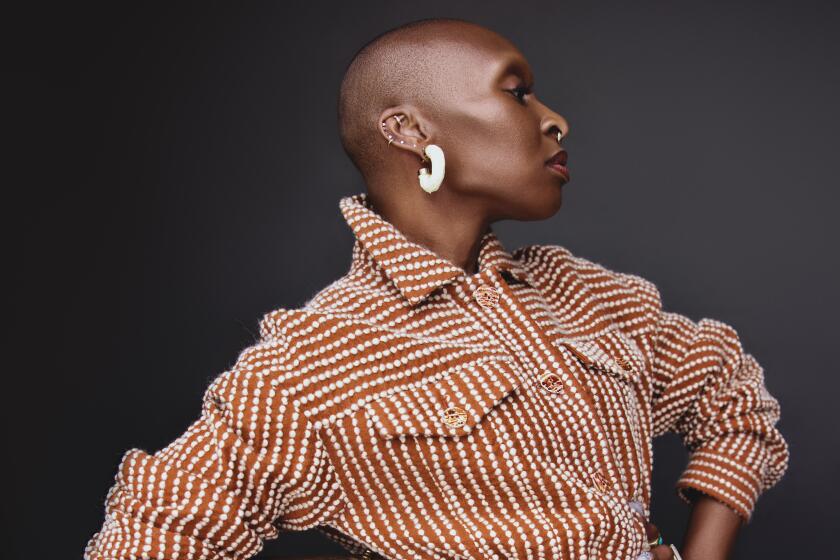Column: Farmers Insurance will pay a high price for discriminating against its female attorneys

- Share via
Reporting from San Jose — Federal District Judge Lucy Koh had some very picky questions Thursday about terminology used in a multimillion-dollar settlement hammered out between Farmers Insurance and the hundreds of female attorneys it has underpaid for years.
I wasn’t expecting fireworks, exactly, but I thought things would be a little more lively for a case that could have a major effect on companies that, even unwittingly, pay men more than women for the same work.
Despite the technical questions coming from the bench, at least one person in the courtroom was absolutely riveted: Lynne Coates, a former Farmers attorney who discovered during a casual work conversation two years ago that a male colleague with less experience was earning more than she. Not too much later, she also found out her male litigation partner was being paid twice her salary — $185,000 versus $99,000. The man could hardly be considered more experienced than Coates; he earned his law license a year after she earned hers.
Coates, 50, complained to her manager, who responded by effectively demoting her, giving her work more suited to a paralegal than an experienced trial attorney.
“It was embarrassing and humiliating,” she told me last year. “My job was taken away from me.”
She quit and filed a lawsuit, alleging Farmers had broken state and federal discrimination laws. Within months, nearly 300 female attorneys joined the class-action lawsuit. Nearly 200 of them are current Farmers attorneys.
::
Farmers has agreed to pay $4 million. As lead plaintiff, Coates will receive at least $85,000.
But more important, the company has also agreed to an impressive series of reforms, including increasing the number of women attorneys in its higher salary grades.
Also, for a period of three years, a company official will monitor compliance with the agreement, provide diversity training to attorneys and give progress reports to San Francisco attorney Lori Andrus, who represented Coates and the other plaintiffs, along with San Jose attorney Lori Costanzo.
“An excellent agreement,” Koh said.
“This is a substantial victory, and a good model going forward,” said UC Hastings law professor Joan Williams, an expert on workplace gender issues.
I wondered if three years was enough time to reverse decades of subtle workplace discrimination.
Andrus said she was pleased. “We think it’s plenty of time for them to really, really clean up their act,” she said.
See the most-read stories this hour >>
::
In the end, the case boiled down to a battle of statistics.
Farmers wanted to compare attorneys in small, individual branch offices, which Andrus and Costanzo resisted. “If you look just at their San Jose office, which employs eight attorneys, it’s such a small number that comparing them makes it difficult to draw any conclusions,” she said. But when the salaries of Farmers attorneys all over the country were compared, Andrus said, “the wage gap quadrupled.”
Not surprisingly, greater disparity occurred at the higher salary grades. Perhaps the male attorneys in those grades had more experience than their female counterparts? To control for that, Andrus and Costanzo looked at the dates each attorney passed the bar as a measure of experience.
“We found that women were much more likely to be in a lower salary grade,” Andrus said, “regardless of bar date.”
So although women and men were both hired into lower salary grades, women basically got stuck there.
“It’s not that women were being demoted,” Andrus said. “But a man would get groomed and promoted. Basically, there is male favoritism, which is probably unintentional. It’s a vestige of the good old boy network.”
::
Increasingly, employers are recognizing that pay gaps may be unintentional, but are unmistakably real.
Last year, the San Francisco-based tech giant Salesforce awarded $3 million in raises after discovering, through a voluntary salary analysis, that it had a gender wage gap. “We did find quite a few women who were being paid less than men and we’ve made that change,” Chief Executive Marc Benioff told CNN. “With just the push of one button, every CEO in the world can know exactly what is their pay discrepancy between men and women, and I hope that every CEO pushes that button.”
That would be nice.
“If we see more and more of these audits,” said California Democratic state Sen. Hannah-Beth Jackson, “I think we are going to see major shifts.
Jackson co-authored a new state law, the California Fair Pay Act, that has been described as “one of the most aggressive” equal pay laws in the country. It was incorporated into the Farmers lawsuit on behalf of plaintiffs who still work at the company.
One reason the law has been hailed as a breakthrough is that it requires companies to pay employees equally for work that is substantially similar — not exactly the same. That is a critical twist.
Join the conversation on Facebook >>
“The pay scale for a janitor in a hotel is greater than a housekeeper,” Jackson said. “Why is that? The work is substantially similar, and yet most janitors are men, most housekeepers are women.”
The law also shifts the burden of proof. Bosses are now required to show that a wage differential is the result of a bona fide factor like education, training or experience, not sex.
In the court hallway after the hearing, Coates was beaming. “I feel good,” she said. “The changes that Farmers has agreed to implement are going to make such a difference for the women in the company, and that is what this is all about.”
Maybe so. This year, Andrus said, Farmers gave unscheduled raises of $10,000 to $13,000 to female attorneys who are plaintiffs in the lawsuit.
It’s a start. But barely.
Twitter: @AbcarianLAT
ALSO
Gender equality? It doesn’t exist anywhere in the world
The gender pay gap: In California, it adds up to $39 billion
Pay gap growing between men and women working for L.A. County







